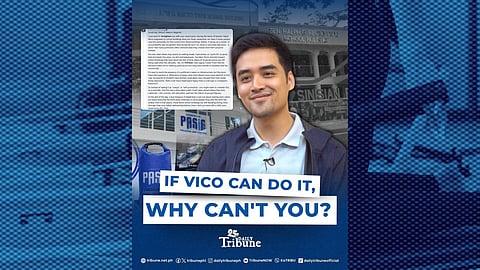
- NEWS
- the EDIT
- COMMENTARY
- BUSINESS
- LIFE
- SHOW
- ACTION
- GLOBAL GOALS
- SNAPS
- DYARYO TIRADA
- MORE

Let’s settle this once and for all: government projects do not belong to politicians. Roads, bridges, classrooms, hospitals — they are built with taxpayers’ money, not with the personal savings of mayors, governors, or senators. Which is why plastering their names across these projects isn’t “accountability,” it’s vanity.
I read the commenter who passionately defended the practice: that having the name of Senator Ralph Recto engraved on school buildings was not ownership, but recognition and accountability. That it was a marker of his prioritizing education. That because the buildings lasted 20 years, his name deserved to live on in brass.
Accountability? Don’t make me laugh. Accountability doesn’t mean stamping your name on a wall like a cattle brand. True accountability is being answerable to the people, through audits, transparency reports, and results that speak for themselves. You don’t need your name in gold letters for citizens to know if you’ve delivered.
Let me point you to Pasig Mayor Vico Sotto. Vico has always been anti-epal. In fact, his administration institutionalized it with the Anti-Epal Ordinance of 2022, which bans politicians from putting their names and faces on government projects. He said it himself: “Dapat ang focus nasa serbisyo at wala sa politiko.”
The very point of public service is to make sure government works without needing to remind people who was in office. If constituents don’t recognize your contribution unless your name is on the project, then maybe the problem isn’t the public’s forgetfulness — maybe it’s your insecurity.
Even Baguio City Mayor Benjie Magalong has spoken out against this culture, ordering the removal of signages bearing his name.
True leaders don’t need constant applause. Their legacy is lived, not labeled.
The defenders of political branding love to say: “But if the building collapses, at least we know who to blame.” Nonsense. If a school collapses, there are official records, procurement papers, audit reports — all pointing to who held office, who signed the contracts, who managed the project.
Governance isn’t a mystery novel; the documents are there. Social media is there.
A true legacy is when people, long after you’ve gone, still remember you for the right reasons — even without your name carved on concrete. Rizal, Bonifacio — none of them needed tarpaulins.
So to those saying “Wala namang masama,” I say there is. There’s something corrosive about conditioning citizens to think that government projects are gifts from politicians rather than basic services funded by their taxes. It normalizes patronage. It blurs the line between duty and generosity.
If Vico can do it, why can’t you? If he can pass an ordinance, lose “political capital,” and still govern effectively, then what’s stopping others? The answer is simple: ego. The hunger for recognition outweighs the humility of service.
SEE POST. CHECK THE COMMENT SECTION:
